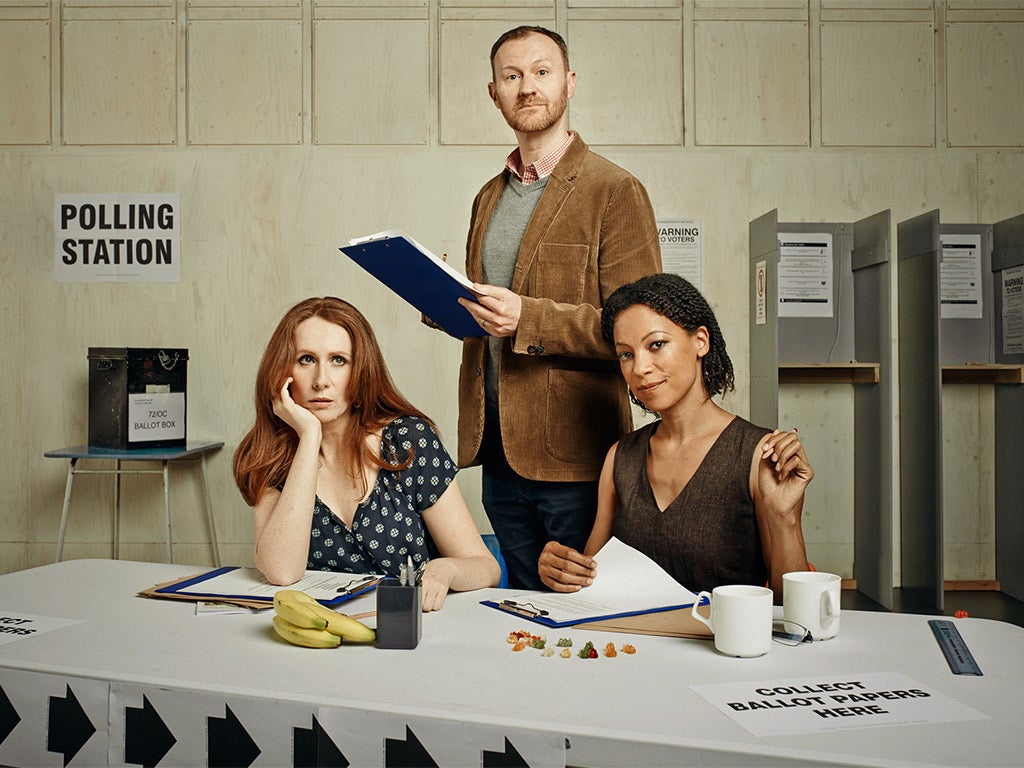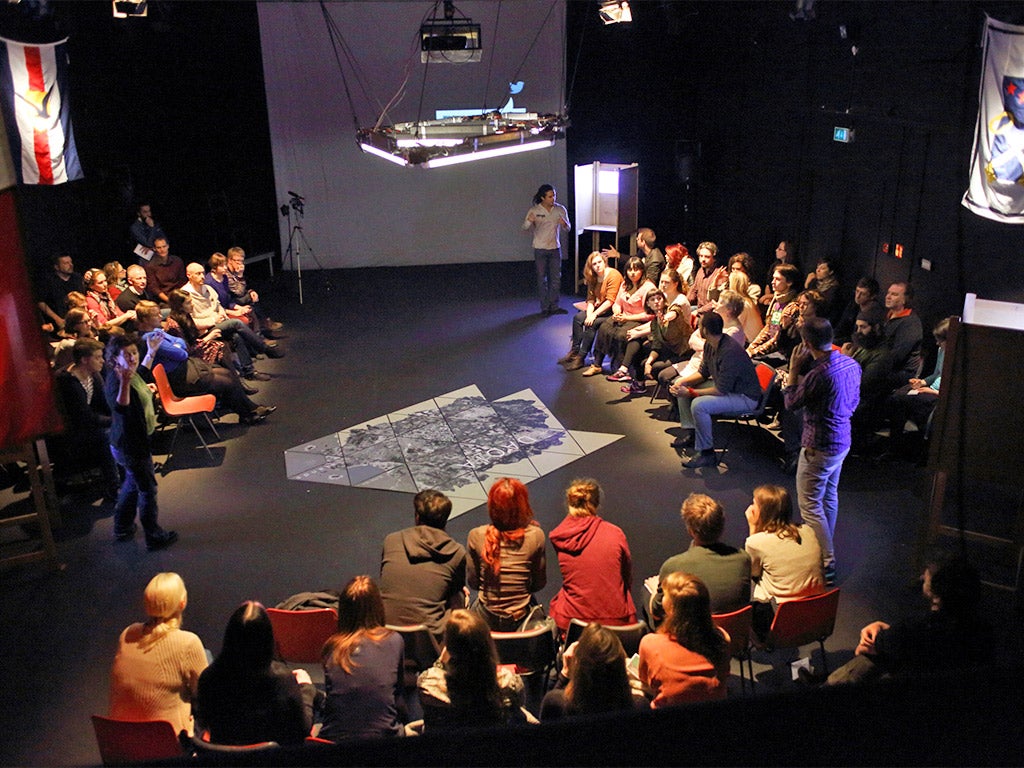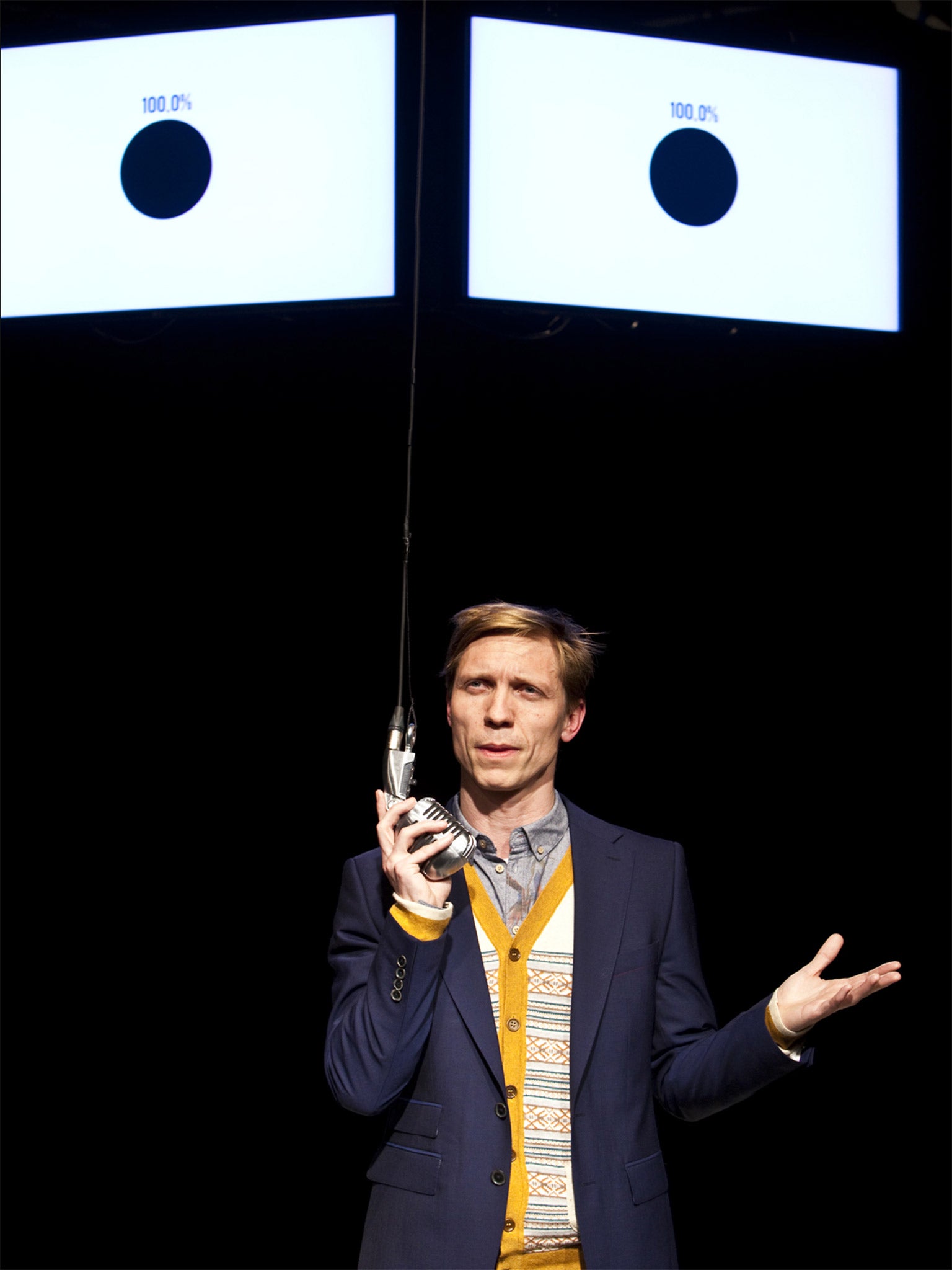With the election looming, British theatre is putting political issues in the limelight
A new wave of interactive political plays is giving a voice to audiences, not dictating what they should think. Matt Trueman meets the playwrights at the forefront of a theatrical revolution

Your support helps us to tell the story
From reproductive rights to climate change to Big Tech, The Independent is on the ground when the story is developing. Whether it's investigating the financials of Elon Musk's pro-Trump PAC or producing our latest documentary, 'The A Word', which shines a light on the American women fighting for reproductive rights, we know how important it is to parse out the facts from the messaging.
At such a critical moment in US history, we need reporters on the ground. Your donation allows us to keep sending journalists to speak to both sides of the story.
The Independent is trusted by Americans across the entire political spectrum. And unlike many other quality news outlets, we choose not to lock Americans out of our reporting and analysis with paywalls. We believe quality journalism should be available to everyone, paid for by those who can afford it.
Your support makes all the difference.Political theatre is changing. Once, it was all agit-prop and state-of-the-nation plays. It campaigned or it caught the mood. Those forms are alive and well in 2015. Think of Jack Thorne lambasting local council cuts in Hope or Mike Bartlett or Philip Ridley lampooning property prices in Game or Radiant Vermin. Increasingly, though, political theatre is ignoring the issues – and it's all the more interesting for it.
Against all the talk of our need for new politics, new forms of political theatre have emerged. In the build-up to the election, Britain is awash with such shows, but very few of them could be called campaigning. They're less interested in telling us what to think, as allowing us to think for ourselves.
Take Early Days (of a Better Nation), an interactive piece by a company called Coney that entrusts its audience with building their own political system. It is, in a way, a live-action role-playing game. Participants become the citizens of Dacia, a fictional central European country beset by problems – rampant nationalism, borders under threat, a raging epidemic – all after a civil war has spawned factionalism.
That splits the audience into three groups, each of which must debate and decide upon a preferred mode of governance: democracy, anarchy or dictatorship. "The agency of the audience is to shape their system," explains co-creator Tom Bowtell, "then we throw things at that system to see how well it holds up."
Behind the scenes, Bowtell and co. write as the show plays out, incorporating the collective choices into a new-minted narrative each night. It's even possible for the audience to break the show. They've had sit-in protests to prevent ballots and a group of real-life anarchists voting to exile Dacia's media, Coney's in-built narrator. Still the company adapt to fit. "That was the world they'd chosen."
Fight Night also cedes control to its audience – although it's more deceptive in its democracy. Belgian company Ontroerend Goed, regular controversialists at the Edinburgh Fringe, started toying with voting mechanisms. "Wouldn't it be exciting if people voted somebody off the stage," enthuses director Alexander Devriendt. "Like reality television, but live." In Fight Night, then, five actors compete for our favour and our votes. The system, however, has a habit of manipulating the result – largely because contenders have a knack of manipulating us.

"You always vote for the wrong reasons," says Devriendt. "The best singer never wins The Voice. The best boss never becomes The Boss." Extend that into something that matters and the best leader never becomes PM. In 2011, a Belgian nationalist politician took part in a television quiz show. Devriendt's own grandmother warmed to him – not for his politics, but for his personality. In Fight Night, none of the performers actually announces policies. They talk like politicians, but they don't talk politics. Still they win our votes.
Both shows actively involve their audience. They're not telling us about politics. They're letting us play at politics. "It's about being given an opportunity to do and experience something, rather than being shown it," explains Bowtell. "Allowing politics to emerge from a system or a structure means that people can connect with those ideas, rather than having those ideas – however beautifully – imposed upon them."
Devriendt agrees: "I believe the time for statements – explicit, moralising statements – is over. It's just not helping." The point is that these shows give individual audience members the room to reach their own conclusions. Early Days... isn't didactic," says Bowtell. "There isn't a win-state or a hidden path to left-wing glory." Likewise, though Fight Night includes a voice that chimes with Devriendt's own view, namely that the democratic majority oughtn't override minority views entirely, the show itself doesn't advocate that. "I don't want to say, 'These are the true winners of the argument."
Interesting, too, that both pieces ignore the political issues at hand to focus on the political mechanisms at play. Playwright James Graham's recent work has done the same. This House looked at the compromise of coalitions, but ignored the issues for the whipping and wrangling to show us the way Westminster works. His new play, The Vote, is set in a polling station on election day. A cast of 80 – among them Judi Dench, Catherine Tate, Mark Gatiss and Timothy West, no less – will pop in to cast their vote: Tory, Labour, Lib Dem and all. Again it's not about who, what or why, but how. "It's time to reflect upon those mechanisms," says director Josie Rourke.
Rather than winning us over, these shows seek to empower us. So does Stand by Chris Goode, a verbatim piece that focuses on ordinary people and ordinary lives. In it, six actors embody six individuals who have, in their different ways, taken a stand for or against something. Some are all-out activists, others volunteers. One simply spoke up on public transport where others kept silent.
Goode wants us to reconsider our own agency. "We might not superglue ourselves to the headquarters of a PR firm," he says. "We might not occupy the stage at Stratford-upon-Avon. But we are all making decisions all the time about how we interact through the world."

However, Stand's politics runs deeper than that. It gives a platform to people that wouldn't ordinarily have one, and asks us, the audience, to listen. Another of Goode's verbatim pieces, Monkey Bars, used the words of children – a group we often ignore or dismiss. In 9, his company helped nine members of the local community make their own short solo performances, to express whatever they wanted. It was as if the entire mechanism of a regional theatre – all its facilities, staff and expertise, not to mention its audience – were being turned to the disposal of its community. These shows are political events in their own right. They're not about politics. They are politics. "We're accepting the invitation to pay attention," says Goode. "The kind of political theatre that I'm excited about at the moment is keen to promote in theatre a plurality of voices, a diversity of opinions anda multiplicity of readings. It's not trying to tell you what to think, but to invite you to think."
The point is that the context has changed. All of these artists argue that the audience arrives better informed. "It's not that they're smarter," says Devriendt, "just that we know a lot more."
Goode goes further. He reckons that even if we don't already know, the information is so readily available, only ever a Google search away, that ignorance is kind of a choice in itself. "Theatre's not always well placed to do the kind of political work a leaflet can do."
What theatre can do, however, is create a space for consideration. Where the bombard of information greets us in real life, when we're busy just trying to get by, we can't take it in – not really. Arguably, there's a world-weariness to this; a tacit admission that theatre isn't going to spontaneously trigger the revolution that changes the world. "Not changing the world," says Goode, "but changing our world."
"The conversations in the bar afterwards might not be world-changing, but they can be week-changing. And if you can have a week-changing conversation every week, then we're off to the races."
THE POLITICAL STAGE
Early Days (of a Better Nation)
Coney's interactive game-theatre casts its audience as citizens, asks them to form a government and steer their country through a crisis.
Battersea Arts Centre, 21 to 25 April then touring
The Vote
James Graham's new play is set in a polling station on election day. A mammoth cast, full of familiar faces, turn up to mark their cards. Broadcast live on election night.
Donmar Warehouse, 24 April to 7 May; More4, 7 May, 8.30-10pm
Fight Night
Democracy in action: Belgian collective Ontroerend Goed put democracy to the test, as five performer-politicians vie for the votes of their audience. Who wins? You decide.
Unicorn Theatre, 16 April to 3 May
Stand
A reflective verbatim piece from theatre-maker Chris Goode, celebrating the ways in which all of us stand up for our beliefs.
Battersea Arts Centre, 20 April to 9 May
U Decide
A week-long festival of political theatre, featuring George Osborne's speeches turned into death metal and "Confirmation", Chris Thorpe's consideration of political extremism.
Liverpool Unity Theatre, 5 to 9 May
Join our commenting forum
Join thought-provoking conversations, follow other Independent readers and see their replies
Comments